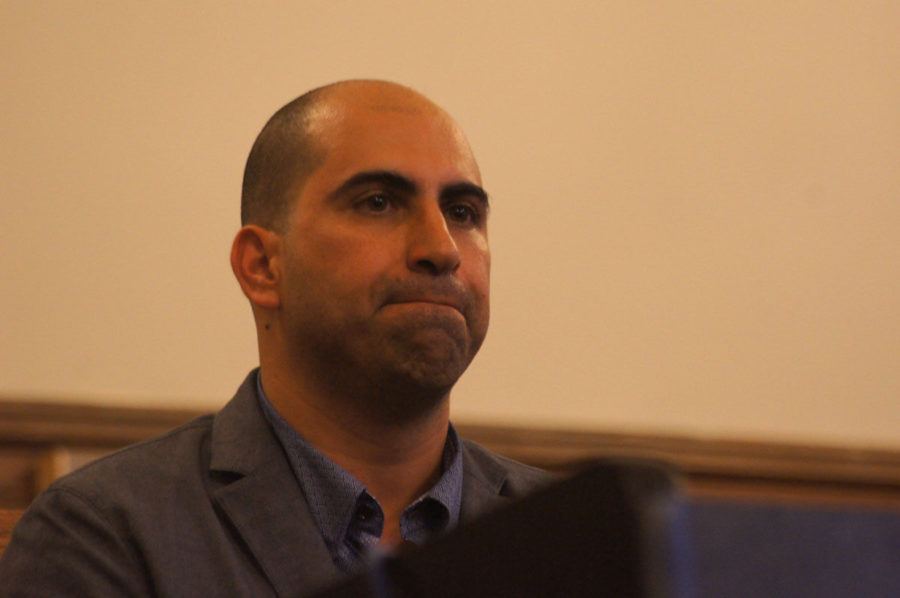Board of Trustees rejects Salaita’s appointment to American Indian Studies program
Steven Salaita’s appointment to the American Indian studies program was rejected by the University Board of Trustees after a series of inflamatory tweets.
December 16, 2014
On Sept. 11, the Board of Trustees voted 8-1 to reject the appointment of Steven Salaita to the American Indian Studies program on the Urbana campus.
“I’ve come to the conclusion that Professor Salaita’s approach indicates that he indeed (is) incapable of fostering a classroom environment where conflicting opinions (are) given equal consideration regardless of the issue being discussed,” said University President Robert Easter during the board meeting.
The controversy surrounding the former Virginia Tech professor began this summer when several of Salaita’s tweets regarding the Israeli government and its most recent incursion into the Gaza Strip were brought to Chancellor Phyllis Wise’s attention. She notified Salaita via email on Aug. 1 that she would not be forwarding his appointment to the board for approval.
Some of the tweets in question ranged from, “Only #Israel can murder around 300 children in the span of a few weeks and insist that it is the victim. #Gaza #GazaUnderAttack,” to “At this point, if Netanyahu appeared on TV with a necklace made from the teeth of Palestinian children, would anybody be surprised? #Gaza.”
Speaking at a press conference held at the University YMCA on Sept. 9, Salaita addressed the tweets, which he believes were “critical of recent Israeli human rights violations.”
Get The Daily Illini in your inbox!
Salaita asserted that labeling his tweets as uncivil is highly subjective and sets a dangerous precedent for future faculty members with unconventional beliefs.
“My comments were not made in a classroom or on campus; they were made through my personal Twitter account,” Salaita said at the press conference. “The University’s policing and judgment of those messages places any faculty member at risk of termination if University administrators deem the tone or content of his or her speech ‘uncivil.’”
At the board’s Sept. 11 meeting, Wise chose to forward Salaita’s appointment to the trustees, although she expressed her belief that Salaita should be rejected for a position in the American Indian Studies program.
Prior to September’s vote, the University faced widespread criticism for denying Salaita a tenured position at the Urbana campus.
More than 5,000 academics have participated in an ongoing boycott against the University, resulting in numerous guest lecturers cancelling their appearances. In the weeks leading up to Salaita’s rejection by the board, the American Association of University Professors sent a letter to Wise urging her to reinstate Salaita to the program and 14 academic departments issued votes of no confidence in Wise.
“I’m saddened that this has happened, obviously, because no confidence really means that they have no confidence in my leadership, and I take that very seriously,” Wise said in an interview with The Daily Illini Editorial Board in October. “I hope we can have a good conversation and a better understanding and even if we don’t come to total agreement, we at least understand and respect each other.”
In addition to the boycott and votes of no confidence, a Change.org petition calling for Salaita’s reinstatement reached more than 19,000 signatures, as of press time. Several student and faculty-led protests took place across campus in the weeks leading up to the board’s vote.
However, there were also those who supported the trustees’ move to reject Salaita’s appointment. Speaking at the Sept. 11 meeting, Josh Cooper, senior in LAS, presented a petition supporting Chancellor Wise consisting of more than 1,000 student signatures compiled in 48 hours.
“Chancellor Wise, we admire your courage, your wisdom and your ongoing efforts to ensure civility on our campus,” Cooper said, quoting the petition. “Hate speech is never acceptable for those applying for a tenured position. Incitement of violence is never acceptable, (and) yes, there must be a relationship between free speech and civility.”
The University administration also took heat over hundreds of emails released through a Freedom of Information Act request, which revealed days before Wise notified Salaita she would not be forwarding his appointment to the board, she was lobbied extensively by a handful of students, alumni and donors opposed to Salaita’s appointment.
While the names of those in email communication were redacted, many could easily be identified as University alumni and donors from the content of their messages, some of which explicitly stated that they would no longer contribute to the University if Salaita was hired.
“We will now cease our annual contributions to the University and will let our fellow alumni know why we are doing so,” an alumnus said in an email dated July 24. “We will encourage others to join us in this protest, as perhaps financial consequences will sway you even though morals, common sense and decency did not.”
At his Sept. 9 press conference, Salaita expressed concern over the possible influence donors may have had over an academic appointment.
“This risks creating a Palestinian exception to the First Amendment and to academic freedom,” Salaita said. “The ability of wealthy donors and the politically powerful to create exceptions to bedrock principles should be worrying to all scholars and teachers.”
However, Wise defended the Board’s decision to The Daily Illini Editorial Board, stating donors had no direct influence over the vote.
“Everywhere I’ve gone, I’ve tried to reemphasize that I was not at all influenced by donors,” Wise said. “I never went back and checked whether they had been a donor or whether they were possibly going to be a donor, whether we were talking with them already about a possible gift.”
Although nearly three months have passed since the board rejected his appointment, Salaita’s fight against the University has continued to make headlines. In a recent conversation with the Daily Illini, Salaita said he still hopes to join the AIS program and work with the University to put the controversy in the past.
Josh can be reached at [email protected].







